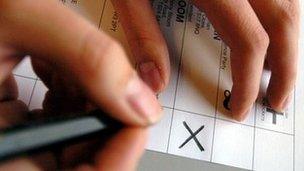Voter registration push for under-24s
- Published

The government is launching a new push aimed at getting more young people on to the electoral register.
Councils will be given a share of £4m if they find creative ways of getting more 16 to 24-year-olds and other under-represented groups to register.
Communities are also being asked to come up with ideas to get people involved in the democratic process with the best ones being backed financially.
The UK is moving to a system of individual voter registration in 2014.
At the moment, people are registered by household with the head of a household responsible for ensuring all eligible voters are included.
But, in future, everyone will be expected to register individually, providing identification such as their National Insurance number.
Tackling fraud
Councils are beginning a rehearsal of the new system which comes into force in England and Wales next June and in Scotland in September 2014, following the independence referendum.
Labour has warned that the switch could see millions of people being potentially disenfranchised, but the government says it will help eliminate fraud and make the register more accurate.
Ministers say two-thirds of people already on the register will not have to do anything because the current register will be matched against other public databases such as that held by the Department of Work and Pensions.
Those people whose records do not match will be asked to register using the new form.
The government's campaign, external, launched at the Local Government Association conference, is targeting those with historically low levels of registration, including under-24-year-olds, social tenants and hard-to-reach groups, such as students.
"If you aren't on the register, you can't vote, simple as that, but it's also an important part of being a member of society," Cabinet Office minister Chloe Smith said.
"For example, it could have an impact on your credit rating and your application for a mobile phone contract.
"We all share responsibility to encourage everyone entitled to vote to get registered to do so. This means not only the government, but also civil society, campaigners, politicians and parties."
Electoral registration officers are currently testing the computer system that will be used to match the names and addresses of existing electors against the Department for Work and Pensions database.
- Published4 November 2011
- Published11 October 2011